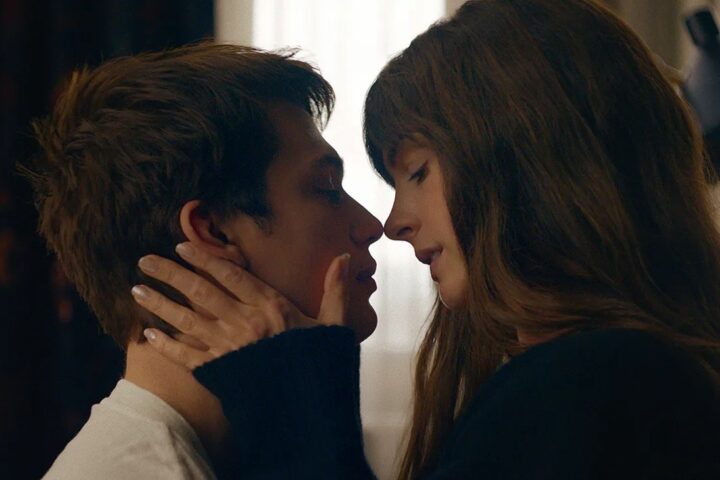If one of the most singular functions of film is the preservation and reanimation of things that no longer exist, then Basma Al-Sharif’s work is now among the more urgent expressions of the medium in recent memory. This year’s edition of the Berwick Film & Media Arts Festival (BFMAF) dedicated a significant portion of its programming to the Palestinian-American visual artist, exhibiting several selections of her older shorts dating back almost 10 years, as well as her 2017 feature-length essay film/process piece Ouroboros.
A significant chunk of the latter effort takes place in Gaza, and though the project’s inception and filming predated the recent escalation of the Middle Eastern conflict, it’s difficult not to compare its documenting of shelled, dilapidated urban scenery to the newer images of unprecedented devastation leaking out through social media channels on a daily basis. In an impassioned and surprisingly frank Q&A, Al-Sharif expressed her gratitude for the unequivocal opposition the festival organizers displayed toward the destruction of her ancestral homeland, the event’s relatively low profile presumably affording it a freedom of expression denied elsewhere in the culture sector, particularly in her adopted home of Berlin.
However, Al-Sharif also insisted on the general futility of putting any explicitly political messaging in her work, particularly when concerning injustices that have been established, communicated clearly, and willfully ignored for several decades or more. That the drone footage she uses in her films to comment on the territory’s designation as a mere topology under military surveillance was shot by a local journalist and friend who has since been killed in an Israeli attack further emphasized an overpowering feeling of division and loss, something that Al-Sharif’s films seem to alternately acknowledge and defy.
Whether directly related to the conflict or not, reversals, recurrence, and the limits of representation are preoccupations of Al-Sharif’s work. Throughout, vivid sunlit footage of scenic vistas, crashing waves, or opulent interiors is often played backwards for extended periods of time, enabling a more analytical or reflective attitude on events and settings that are so often predetermined by unrelenting outside forces. This defamiliarization technique is particularly effective in one of Ouroboros’s early sequences, which follows a Gaza-based domestic worker going about her daily routines from room to room, simultaneously restoring and undoing the order of a home that is under continual threat of extinction.
Elsewhere, “Capital” (which screened together with “Renee’s Room”) culminates in an ironic and often overwhelming sequence in which a glamorously attired woman listens to Egypt’s incumbent president holding forth on his past achievements and plans for the nation’s future, before being driven to the verge of orgasm by a disembodied voice reading out names of luxury housing projects and iconic global locations, superimposed with kaleidoscopic virtual images of the country’s booming waterfront development. Al-Sharif is at her most impactful when staging these kind of blunt, unexpected juxtapositions, teasing out the effects that the reconfiguring and remapping of physical space can have on the psyche.
An equally ambivalent attitude toward ideas of progress can be found in A Stolen Meeting, restored and exhibited at the festival to commemorate the 100th anniversary of the birth of Estonian director Leida Laius. First released in 1988, her seventh and final feature sees the tenacious Valentina (Maria Klenskaj) returning from a five-year stint in a Soviet prison to find her homeland of Estonia in the early stages of embracing its own form of liberation, represented by Western free-market consumerism. Reconnecting with a series of old friends, acquaintances, and relatives in an effort to track down the child she gave up for adoption before prison, having refused to “hide behind” him in order to secure a more lenient sentence, she goes to increasingly extreme measures to rediscover some sense of self that seems to have been lost.
As shots of a group shower at the jail and the subsequent cramped train ride back to Tallinn are soon superseded by scenes in designer clothing outlets, lively nightclubs, and Kafkaesque bureaucratic institutions, Valentina finds her individualist way of life on the outside to be no less restrictive. A Stolen Meeting depicts her dogged search for her son with a vitality that stands in stark contrast to its oppressive, imposing settings. Regularly deploying dynamic pans and crash zooms (often to the point of distraction), Laius barely keeps the camera still throughout, except for off-kilter close-ups of faces or establishing shots of busy, over-elaborate interiors.
The force of Valentina’s search for connection strains at the leash of an alienating social order that seems to mirror her own dislocation and regret, with the occasional contemplation of Estonia’s picturesque, barren wintry landscape providing the only respite. Though the final third of the film occasionally veers into sentimentalism, it is nevertheless a poignant depiction of a flawed, vulnerable yet defiant woman in a world that no longer has a place for her.
Recently, BFMAF’s Saturday night slot has become an opportunity to revive the tradition of the disreputable midnight movie, and that particular honor fell this year to Ion de Sosa’s 49-minute Mamantula. The Spanish filmmaker’s genre mashup fuses queer erotica and outlandish B-movie sci-fi with a stark, noirish police procedural in a way that proves oddly coherent, primarily due to the undercurrent of sardonic humor running throughout. In this ersatz Under The Skin, an extra-terrestrial spider disguises itself as a leather-clad man (Moisés Richart) and cruises the streets, shopping centers, gay clubs, and public toilets of Berlin in search of victims to consume, leaving them quite literally sucked dry as its increasingly aggressive fellatio culminates in the innards of his victims evacuating their body at the moment of orgasm.
Underpinning its lurid premise, the backbone of the film is the police department’s methodical but often comically inept efforts to track down the perpetrator of these baffling, gory murders. Indeed, as the preposterous story progresses and the motivations of the dimension-hopping arachnid become increasingly obscure, the show is ultimately stolen by the droll dialogue and cheeky flirtation between the two female cops (Lorena Iglesias Lista and Marta Bassols) leading the case. Though Mamantula flits anarchically between graphic, intense sex scenes, deliberately cheap CGI sequences that wouldn’t look out of place in an early-’90s high school educational video, and shots of glistening, barely recognizable fluids and viscera, the sudden unveiling of an ACAB tattoo on the lower back of a detective is probably its funniest and most memorable moment, epitomizing its playful yet earnest sense of provocation.
Singapore’s Nelson Yeo pulls off a similar, though less extreme, melding of styles with Dreaming & Dying, which screened at BFMAF less than a year on from its being awarded a Golden Leopard in the debut feature category at Locarno. Yeo’s film also exhibits its own dry sense of humor, which keeps the more indulgent tendencies of his slow cinema approach in check. The loose, minimal narrative follows a married couple (Doreen Toh and Kelvin Ho) and their childhood friend Heng (Peter You), who reconnect in middle age at a high school reunion and soon find repressed feelings and memories starting to re-emerge. The latter half then sees Heng and his unrequited love head out into a remote forest to perform a Buddhist ritual that is intended to help her husband recover from a serious illness.
Using sedate pacing and digressive, repetitive dialogue to blur the boundaries between deadpan everyday mundanity and impressionistic fantasy, the film is strongly reminiscent of Apichatpong Weerasethakul, particularly with its motif of a romantic union between human and fish (shades of Uncle Boonmee Who Can Recall His Past Lives). It might ultimately prove a little too meandering and unfocused for its own good, but the intoxicating effect of its lush nature imagery and Yeo’s frequently striking pictorial tableaus does convey a sense of characters isolated in their own separate reveries, gradually drifting apart even as they seek to get closer. A heartbreaking ending drives home the proximity of the titular themes, and the impossibility of turning back the clock on lives of unanswered questions and thwarted desires.
Berwick Film & Media Arts Festival runs from March 7—10.
Since 2001, we've brought you uncompromising, candid takes on the world of film, music, television, video games, theater, and more. Independently owned and operated publications like Slant have been hit hard in recent years, but we’re committed to keeping our content free and accessible—meaning no paywalls or fees.
If you like what we do, please consider subscribing to our Patreon or making a donation.




